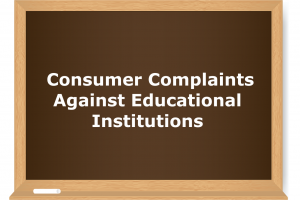In Buddhist Mission Dental College and Hospital v. Bhupesh Khurana[1] the appellant had published an advertisement inviting applications for admission to Degree Course of Bachelor of Dental Surgery. The advertisement was ‘misleading’ in several ways. It was held by two Judges of the Supreme Court of India on 13.02.2009, that this was a case of total misrepresentation which is an ‘unfair trade practice’; the appellant was neither affiliated nor recognised for imparting education; this fell within the purview of ‘deficiency’ under the Consumer Protection Act, 1986 (‘the Act’). However, in Bihar School Examination Board v. Suresh Prasad Sinha[2], two-Judges Bench held on 04.09.2009 that the appellant was not rendering any ‘service’ and a ‘complaint’ under the Act would not be maintainable against it, for a fault in conducting an examination. We nearly hear an echo in Maharshi Dayanand University v. Surjeet Kaur[3] and in State of Tamil Nadu v. K. Shyam Sunder[4]: a student is no ‘consumer’.
In Punjab Urban Planning and Development Authority v. Vidya Chetal[5], three Judges were clear, that the definition of ‘service’ is not exhaustive and the legislature has left the task to the judiciary to explain the provision on a case to case basis. “The purpose of leaving this provision open ended, without providing an exhaustive list indicates the requirement for a liberal interpretation.” How then are, mostly all activities related to educational institutions excluded from the reach of the Act?
In Kerala Tourism Development Corporation Ltd. v. Deepti Singh[6], two Judges were of the view that the finding of ‘deficiency’ of ‘service’, arrived at by National Consumer Disputes Redressal Commission (‘NCDRC’), was correct. The deceased, with ample future prospects, had drowned in a swimming pool of a hotel. The lifeguard on duty had also been assigned the task of being a bartender. This was considered to be a deviation from duty of care and amounted to ‘deficiency’ of ‘service’ of the hotel management. In light of the above, if a student (‘XYZ’), while justifiably pursuing the extracurricular activity of a swim in an intra-school contest, suffers injury on account of an employed, negligent lifeguard – will not the school be liable under the Act?
Once Manu Solanki v. Vinayaka Mission University[7] (‘Solanki’) is decided by the Supreme Court there would be a final answer. It is interesting, the question, for the time being, was answered in negative on 20.01.2020 when Solanki was before NCDRC in Manu Solanki v. Vinayak Mission University[8]:
“Such incidental activities of an educational institution while imparting education would not amount to rendering any ‘service’ under the provisions of the Consumer Protection Act, 1986.”
This would mean, not only ‘consumer law’ has no remedies for XYZ but also for a student who suffers injury, in a picnic organised by an educational institution, on account of an employed, negligent bus-driver.
Whether it be concerning the Act or the Consumer Protection Act, 2019, a ‘deficiency’ is certainly an imperfection or inadequacy in the quality of performance, undertaken to be performed, in relation to any ‘service’ of entertainment or amusement. If one considers: (i) ‘service’ requires a liberal interpretation; (ii) many of us are personally witness to, and data should be collected on the same, several schools demand lofty amounts of donations and a submission of income tax details of parents of the child; and (iii) educational institutions often charge exorbitant fees for boarding, food etc., it becomes clear that the conclusion, a student is no ‘consumer’, cannot and should not always be correct. It merits an explanatory thought every time. The jurisprudential basis for the rule of widest construction, as relatable to being liberal, must be elastic enough to meet new social realities.
Thus, the order of the Bench comprising of Dr. D.Y. Chandrachud, Indu Malhotra and Indira Banerjee, JJ. on 15.10.2020 in Solanki[9]: “Since there are divergent views of this Court bearing on the subject as to whether an educational institution or university would be subject to the provisions of the Consumer Protection Act, 1986, the appeal would require admission” is correct.
* Practicing Advocate at New Delhi and Kolkata.
[7] Civil Appeal Diary No. 12901 of 2020
[9] Supra Note 7.

